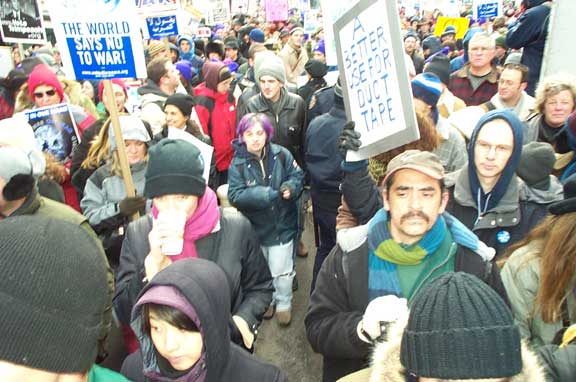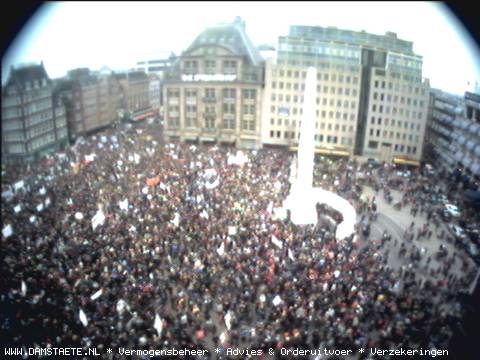Remember? Fifteen million people or more marched against war:
In New York,


in Amsterdam,

And of course, London.

But not just there. Rome had three million people turning up in what was the biggest anti-war demo ever and there were smaller events all over the world, from Cape Town to Vancouver, from Paris to Glasgow. If ever there was a war opposed from the start and pursued against the wishes of the voter, it was this one. And yet all the demonstrations, all the anger didn’t stop it. Five years later Iraq is still occupied, over a million Iraqis have died as a result and those responsible for it have never ever had to suffer the consequences.
It’s no wonder many people have become desillusioned, bitter and cynical; I’ve had bouts of it myself. It’s therefore good to see, over at Comment is Free, Andrew Murray celebrating the very real achievements of the anti-war movement that put 2 million people on the streets of London:
The demonstration was the apex of a broader movement which touched almost every part of society in 2003. This included the greatest-ever engagement of British Muslims in active politics, thousands of school student walkouts, peaceful civil disruption in towns across the country, local authorities coming out against the war, and train drivers declining to move munitions for the invasion.
It was a movement entirely outside the established structures which normally mediate the relationship between people and power. It was organised by the Stop the War Coalition (with CND and the Muslim Association of Britain as our partners), a campaign not 18 months old and run on a shoestring.
Hundreds of thousands of trade unionists joined the demonstration, while the TUC – its eyes on its ministerial connections, not its members – maintained a frigid indifference. Labour and Tory party members protested against their leaders, while Liberal Democrats dragged their hierarchy to the demonstration behind them. Marching at the head of the demonstration, I missed what may have been the most telling sight of the day – Piccadilly blocked by people without a single banner among them. This was the march of the unmobilised.
It was also a march against Murdoch and his mendacious press, exploding the myth of his political omnipotence. Rupert said war, the people said no. All Alastair Campbell’s strategy of controlling opinion through appeasing the Sun in vain!
The demonstration, and the movement around it, exploded the notion that society is slumped in a consumer-sodden apathy, and incapable of political engagement. The country’s biggest mass movement followed a general election with the lowest turnout in modern times, and preceded one in which participation was scarcely improved. The problem is the system, not the people.